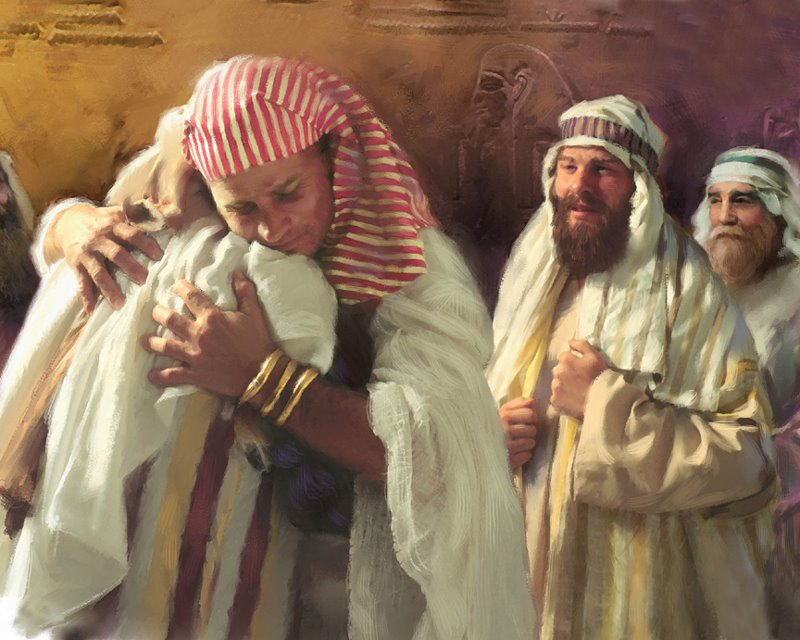Ya'akov's Fear of Going Down to Egypt

The Power of One Man's Personal Kedushah:
After Ya'akov learned that Yosef was alive and well in Egypt, he knew that he needed to go and see him. He set out from his home with his family and all of his possessions and came to Be'er Sheva where he offered sacrifices to the G-d of his father Yitzchak. That night, G-d appeared to him in a prophetic dream and said to him (Bereshit 46:3-4): אַל־תִּירָא מֵרְדָה מִצְרַיְמָה כִּי־לְגוֹי גָּדוֹל אֲשִׂימְךָ שָׁם: אָנֹכִי אֵרֵד עִמְּךָ מִצְרַיְמָה וְאָנֹכִי אַעַלְךָ גַם־עָלֹה וְיוֹסֵף יָשִׁית יָדוֹ עַל־עֵינֶיךָ (Do not be afraid to go down to Egypt, for I will make you into a great nation there. I will go down with you to Egypt and I will surely bring you up from there, and Yosef will put his hand upon your eyes).
Let's ask a couple of questions. First, why was Ya'akov afraid to go down to Egypt? This was the man who staunchly endured Lavan's wickedness for years without breaking. This was the same man who courageously marched toward Esav and his 400 man army without so much as flinching. So what was he afraid of here? Second, why did G-d tell him that Yosef will place his hand upon his eyes? What does that have to do with anything, and how was that statement a comfort to assuage Ya'akov's fear?
In order to answer these questions adequately, we need to try and understand the greatness of Yosef. As is known, Yosef was called the Tzaddik because he kept the integrity of the holy covenant all those lonely years in Egypt—whether as slave, prisoner or even as viceroy over Egypt—he successfully guarded his holy brit from defilement in the midst of all the forces of spiritual impurity that were found there, and he guarded his eyes from seeing anything forbidden. It may be a little difficult to appreciate fully the extent of Potiphar's wife's attempted seduction of Yosef merely by reading the abbreviated account of this story in Sefer Bereshit. After all, it's only seven verses there (39:7-13).
The Gemara adds some details not found in the Chumash (Yoma 35b): אָמְרוּ עָלָיו עַל יוֹסֵף הַצַּדִּיק: בְּכׇל יוֹם וָיוֹם הָיְתָה אֵשֶׁת פּוֹטִיפַר מְשַׁדַּלְתּוֹ בִּדְבָרִים. בְּגָדִים שֶׁלָּבְשָׁה לוֹ שַׁחֲרִית לֹא לָבְשָׁה לוֹ עַרְבִית. בְּגָדִים שֶׁלָּבְשָׁה לוֹ עַרְבִית לֹא לָבְשָׁה לוֹ שַׁחֲרִית (They said about Yosef ha-Tzaddik: every day the wife of Potiphar seduced him with words. [Also,] the clothes that she wore for him in the morning, she didn't wear for him in the evening, and the clothes that she wore for him in the evening she didn't wear for him in the morning). Elegant clothing, sparkling jewelry, and luxurious perfumes in his face, day in and day out. And keep in mind that Yosef was a young man in his prime, with hormones raging all the while being completely cut off from his family's positive influence. The Gemara continues: אָמְרָה לוֹ: הִשָּׁמַע לִי! אָמַר לָהּ: לָאו. אָמְרָה לוֹ: הֲרֵינִי חוֹבַשְׁתְּךָ בְּבֵית הָאֲסוּרִין! אָמַר לָהּ: ״ה׳ מַתִּיר אֲסוּרִים״. הֲרֵינִי כּוֹפֶפֶת קוֹמָתְךָ! ״ה׳ זוֹקֵף כְּפוּפִים״. הֲרֵינִי מְסַמָּא אֶת עֵינֶיךָ! ״ה׳ פּוֹקֵחַ עִוְרִים״. נָתְנָה לוֹ אֶלֶף כִּכְּרֵי כֶסֶף לִשְׁמוֹעַ אֵלֶיהָ לִשְׁכַּב אֶצְלָהּ לִהְיוֹת עִמָּהּ, וְלֹא רָצָה לִשְׁמוֹעַ אֵלֶיהָ (She said to him, 'Surrender to me!' He said to her, 'No!' She said to him, 'I'll confine you to prison!' He said to her, 'Hashem releases the imprisoned.' She said, 'I'll bend your erect posture!' He said, 'Hashem straightens the bent.' She said, 'I'll blind your eyes!' He said, 'Hashem gives sight to the blind.' She gave him 1000 talents of silver so that he'd listen to her, to lie with her and to be next to her, but he did not want to listen to her).
More detail is provided in the Midrash Sechel Tov on Bereshit 39:21. There we learn that she also threatened him with loss of parnasah, but he responded by saying that Hashem provides for the hungry. Finally, the midrash reveals that these temptations continued even after he had been thrown in prison: עד היכן? ר' חנינא בשם ר' אחא עד שנתנה שרתוע, פי' שפוד של ברזל, תחת צוארו כדי שיתלה עיניו ויביט בה, ואעפ"כ לא הי' מביט בה (How far did she go? R' Chanina said in the name of R' Acha, She placed an iron spit under his neck, to direct his glance and get him to look [at her], but even then, he didn't look at her). The midrash derives this from what is written in Tehillim 105:18, a pasuk which describes Yosef's plight while in prison: עִנּוּ בַכֶּבֶל (רגליו) [רַגְלוֹ] בַּרְזֶל בָּאָה נַפְשׁוֹ (They afflicted his leg(s) with chains, iron came upon his soul). The iron which came upon his soul was the iron spit of Potiphar's wife.
We have now arrived at the real issue, the thing that really drove her crazy. It wasn't just that Yosef refused to have relations with her, he refused even to look at her. That was the real test. Everything she did was designed to get him to look at her, but Yosef knew that if he looked, even once, and derived pleasure from that look, he would lose everything. He would never become Yosef ha-Tzaddik, the yesod of the world. He needed to break the power of this impurity in Egypt (and the strength of the Yetzer ha-Ra in the world), and he knew that it had fallen upon him to do it.
Therefore, we learn here that if one wants to be shomer brit, one needs to be shomer einayim, for even a single look can be an aspect of sexual immorality, and therefore, a violation of לֹא תִּנְאָ͏ף (Do not commit adultery). This is why we read twice every day, morning and evening (Bamidbar 15:39): וְלֹא־תָתוּרוּ אַחֲרֵי לְבַבְכֶם וְאַחֲרֵי עֵינֵיכֶם אֲשֶׁר־אַתֶּם זֹנִים אַחֲרֵיהֶם (Do not spy around after your heart and after your eyes, after which you commit fornication).
But there was even more to it than all of that, for the test continued even after he became viceroy. Commenting on a short section of the blessing that Ya'akov gave to Yosef before the former's passing (Bereshit 49:22), בָּנוֹת צָעֲדָה עֲלֵי־שׁוּר (daughters step upon the wall), the midrash in Bereshit Rabbah 98:18 has the following to say: אַתְּ מוֹצֵא בְּשָׁעָה שֶׁיָּצָא יוֹסֵף לִמְלֹךְ עַל מִצְרַיִם הָיוּ בְּנוֹת מְלָכִים מְצִיצוֹת עָלָיו דֶּרֶךְ הַחֲרַכִּין וְהָיוּ מַשְׁלִיכוֹת עָלָיו שֵׁירִין וְקָטֶלִין וּנְזָמִים וְטַבָּעוֹת, כְּדֵי שֶׁיִּתְלֶה עֵינָיו וְיַבִּיט בָּהֶן אַף עַל פִּי כֵן לֹא הָיָה מַבִּיט בָּהֶן (You find that when Joseph went out to rule over Egypt, the princesses would peer through the lattices and would throw bracelets, pendants, nose rings, and rings at him in order that he would raise his eyes and look at them: nevertheless, he did not look at them). Day after day, month after month, year after year, the test went on and on. And Yosef stood firm with a holy, iron will. And thus, he became Yosef ha-Tzaddik for all eternity.
All of this explains a rather strange Gemara. What do you think the Satan is made up of? What is his substance? It is taught in a Baraita (Avodah Zarah 20a-b): ונשמרת מכל דבר רע שלא יסתכל אדם באשה נאה ואפילו פנויה באשת איש ואפי' מכוערת ולא בבגדי צבע [של] אשה ולא בחמור ולא בחמורה ולא בחזיר ולא בחזירה ולא בעופות בזמן שנזקקין זה לזה ואפילו מלא עינים כמלאך המות ('And you shall protect yourselves from every evil thing' [Devarim 23:10], [meaning] that a man should not look at a beautiful woman even if she's unmarried, or at a married woman even if she's ugly, and not at the colored clothing of a woman, and not at a male and female donkey, or at a male and female pig or at birds when they are mating, and even if one is full of eyes like the Angel of Death [i.e. even if he could see from all directions, it's still forbidden to look]). So in such a case, what would he have to do? The only solution would be to keep his eyes shut. That's pretty intense, but that's not our main point here. Rather, we want to focus on the fact that the Gemara reveals an astonishing truth about Satan. He is full of eyes.
Where does he get these eyes from? He gets them from us, from every time we look at something which we are forbidden to look at. A look, an eye, another look, another eye, and then another eye, and another one and so on. We are the ones who fill him up with eyes. And what are these eyes to him? On the one hand, they are his trophies. He shows them off to all who see him (in the upper worlds, for example), and he uses them in the Heavenly Courts to bring charges against us. But in addition to this, what exactly are they? They are the sparks of kedushah that give him his vitality, his life-force. They are the holy sparks from our limud Torah, tefillah and mitzvot that he has taken from us, because the instant that we look, we lose it all. Everything goes to the Sitra Achra. This is what Yosef understood and took very, very seriously. So, perhaps you think this is harsh. But it's not harsh. It's just reality, for if we don't appreciate the severity of this transgression, then how are we going to be able to do teshuvah for the thousands and thousands and millions and millions of forbidden looks?
Now we come back to the first question we asked. What was Ya'akov afraid of? When Avraham Avinu was living in the Negev, there was a famine in the land. Because the famine was very severe, Avraham left and traveled to Egypt. Immediately, upon arriving at the Egyptian border, the Torah tells us something rather strange (Bereshit 12:11): וַיֹּאמֶר אֶל־שָׂרַי אִשְׁתּוֹ הִנֵּה־נָא יָדַעְתִּי כִּי אִשָּׁה יְפַת־מַרְאֶה אָתְּ (And he said to Sarai his wife, 'Behold now, I know that you are a beautiful woman'). Don't think that Avraham was speaking of her inner beauty because he wasn't. He used the phrase יְפַת־מַרְאֶה [yefat mareh] which is a reference to physical beauty. To put it into modern parlance, it was as if Avraham was saying, "Wow! Now I know that you're absolutely gorgeous!" What's going on? We're speaking about Avraham Avinu here, our holy forefather and progenitor of the Jewish People, and the Torah tells us that he was blown away by her physical beauty!? The Midrash Tanchuma explains (Lech Lecha 5:1): מִכָּאן אַתָּה לָמֵד שֶׁלֹּא הָיָה יוֹדֵעַ אוֹתָהּ קֹדֶם לָכֵן כְּדֶרֶךְ הַנָּשִׁים (From this you learn that before this, he didn't know her like the way of women). What does this mean? First, it means that he did not engage in marital relations with Sarai like other men and women. Their unions were always at the summit of kedushah and were never tainted or debased with the lust for satisfying one's appetites. Second, it means that he never actually 'saw' her, or perhaps better, he had never 'recognized' her physical beauty before. In other words, Avraham never really paid any attention to her physical appearance at all. All he saw was her beautiful soul, her inner beauty. That's what he always saw…until this very moment. This agrees with Rashi's summary of the midrash: לֹא הִכִּיר בָּהּ מִתּוֹךְ צְנִיעוּת שֶׁבִּשְׁנֵיהֶם וְעַכְשָׁו הִכִּיר בָּה עַל יְדֵי מַעֲשֶׂה (He hadn't recognized [or perceived] it [physical beauty] due to the modesty of them both, and now, he saw it, through what had happened).
So why all of a sudden did Avraham notice her physical beauty? Was it just because he happened to see her reflection in the water? Was it just the result of a weird coincidence, a chance occurrence? Although he did see her reflection in the water, let's not be superficial in our understanding. The deep reason why he saw it at that moment was because they had arrived at the border of Egypt, and the impurity of Egypt immediately affected him and resulted in a diminution of his personal kedushah. It was that tangible. And this is what Ya'akov was afraid of. We can voice his fear like this: "If my holy grandfather was negatively affected by the impurity of Egypt, just by arriving at the border (!), what will happen to me? I am not at his level. And I will have to enter the very heart of Egypt and spend time there! I'm afraid I'll lose it all. How can I possibly uphold my personal kedushah and continue to be shomer einayim in Egypt, the filthiest, most degraded and perverted place in the world?" That was his fear.
Now we can answer our second question. How did G-d assuage that fear? He said to Ya'akov, "Yosef will put his hand upon your eyes." What's the meaning of this? It is written in Sefer Shemirat Einayim (Al Yedei Anavah Zochim Li'kedushah): אם יוסף נמצא שם, הוא כבר שבר את הטומאה, ואתה תוכל לשמר את העינים(If Yosef is found there, he has already broken the impurity, and you will be able to be shomer einayim). Yes, truly. One man's personal kedushah shattered the spiritual impurity of an entire nation. Hashem was telling Ya'akov that in the merit of his son, Yosef ha-Tzaddik, he would be able to live there, even as he lived in Eretz Cana'an, and remain shomer brit.
So what about us? If we allow these words to penetrate our stony hearts, then we too can achieve great things in our lives. This story doesn't have to be just about Yosef and Ya'akov, it can be about us too. Every time we step outside of our homes or our shuls, we are walking straight into a war zone that is even more dangerous than the streets of Gaza. Now, what soldier goes out to battle without first uttering a prayer? Therefore, before we walk outdoors we should pray to Hashem to give us the strength to fight this war with mesirut nefesh and to return from the field of battle victorious and intact. After all, is it really that terrible to walk into a lamppost? Perhaps only if we care more about what others may think of us than what Hashem thinks of us.






